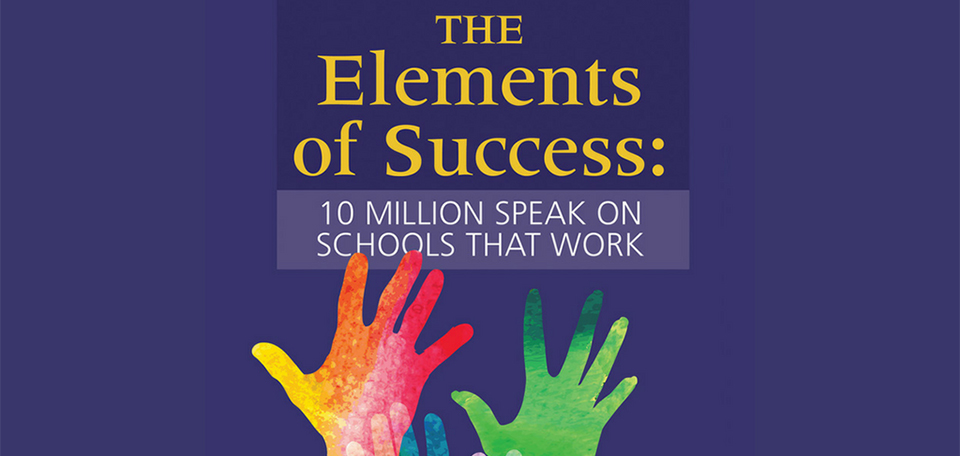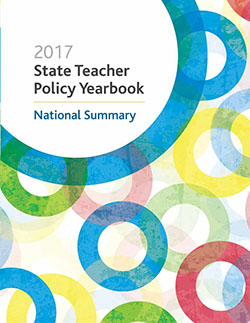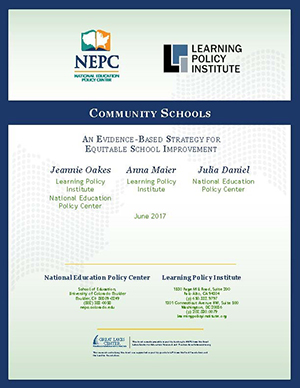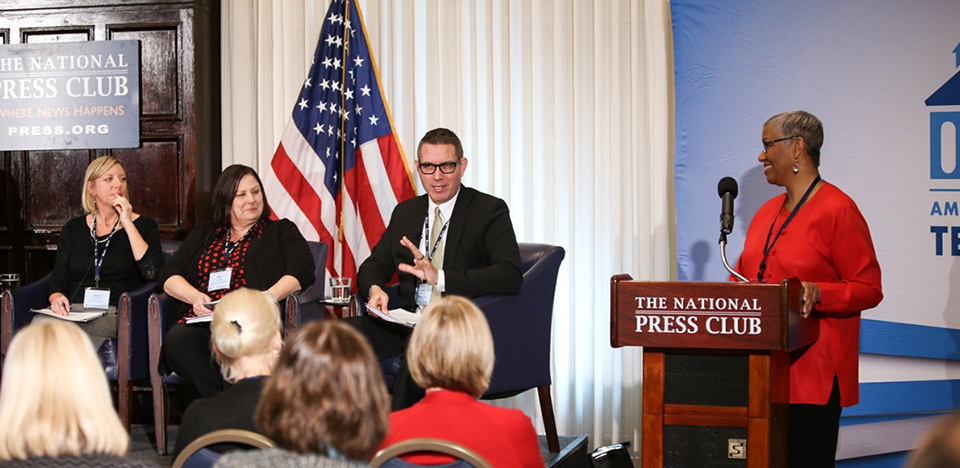26 Jan2018
By JTE Insider

Have you seen the JTE Insider blog managed by the Journal of Teacher Education (JTE) editorial team? Check out the following interview with the author of a recent article. This blog is available to the public, and AACTE members have free access to the articles themselves in the full JTE archives online – just log in with your AACTE profile here.
This interview features insights from the article “Preparing for Culturally Responsive Schooling: Initial Teacher Educators Into the Fray” by Greg Vass of the University of New South Wales (Australia). The article, which appears in the November/December issue of JTE, is summarized in the following abstract:
23 Jan2018
By Kristin McCabe

What makes a public school successful? A new report from the Learning First Alliance (LFA) identifies six common elements critical to success – while also emphasizing that each school must tailor its programs to the specific goals and challenges of its setting. In other words, all successful schools share key characteristics, but how these elements are implemented and integrated depends greatly on context.
LFA members, which include AACTE and collectively represent more than 10 million educators, parents, and local policy makers, contributed their sectors’ best practices and research to the compendium to advance a collective vision of how and why public schools flourish. In addition to AACTE, LFA members include AASA, The School Superintendents Association; American Federation of Teachers; American School Counselor Association; Consortium for School Networking; Learning Forward; National Association of Elementary School Principals; National Association of Secondary School Principals; National Education Association; National PTA; National School Boards Association; and National School Public Relations Association.
19 Jan2018
By Kristin McCabe
Members of the AACTE Clinical Practice Commission speak at the National Press Club January 17. Left to right: Jennifer Roth, Diane Fogarty, Kristien Zenkov, and Jennifer Robinson.
AACTE hosted a press briefing January 17 in Washington, DC, showcasing the work of the AACTE Clinical Practice Commission (CPC) and releasing the report A Pivot Toward Clinical Practice, Its Lexicon, and the Renewal of Educator Preparation.
Held in the historic National Press Club, the briefing opened with a welcome from AACTE Board Past Chair Jane Bray, dean of the Darden College of Education at Old Dominion University (VA). More than half the members of AACTE’s Board of Directors were in attendance, as were 30 members of the CPC and dozens of representatives from Washington-area education organizations, colleges and universities, news media, and AACTE staff.
17 Jan2018
By AACTE
FOR IMMEDIATE RELEASE
For interviews, contact Jerrica Thurman
(202) 478-4502 or jthurman@aacte.org
(January 17, 2018, Washington, D.C.) – Clinical practice and partnership are central to high-quality teacher preparation, and although a variety of delivery models can coexist, they all must incorporate key principles to be effective, according to a report released today by a commission of the American Association of Colleges for Teacher Education (AACTE).
16 Jan2018
By Kristin McCabe

A recent Journal of Teacher Education article proposes a new model to integrate social justice with the concept of pedagogical content knowledge. In “Foregrounding Equity in Teacher Education: Toward a Model of Social Justice Pedagogical and Content Knowledge,” authors Jeanne Dyches of Iowa State University and Ashley Boyd of Washington State University lay out the theoretical model they call Social Justice Pedagogical and Content Knowledge, or SJPACK. A recent podcast interview with the authors for the JTE Insider blog sheds light on the model.
In the interview, the authors explain that since Lee Shulman’s concept of pedagogical content knowledge (PCK) was introduced in the 1980s, it has thoroughly permeated teacher preparation, but it does not explicitly link PCK to equity concerns. They wanted to tease out the different ways this would look in different disciplines.
12 Jan2018
By JTE Insider

Have you seen the JTE Insider blog managed by the Journal of Teacher Education (JTE) editorial team? Check out the following interview with the author of a recent article. This blog is available to the public, and AACTE members have free access to the articles themselves in the full JTE archives online – just log in with your AACTE profile here.
This interview features insights from the article “Preservice to In-Service: Does Mathematics Anxiety Change With Teaching Experience?” by Gina Gresham of the University of Central Florida. The article, which appears in the January-February issue of JTE, is summarized in the following abstract:
12 Jan2018
By Jennifer Roth
The author is a member of AACTE’s Clinical Practice Commission, whose report will be released January 17 at the National Press Club in Washington, DC. The views expressed in this post do not necessarily reflect the views of AACTE.
As an administrator at a clinical partnership high school, I am honored to serve on the AACTE Clinical Practice Commission (CPC) and value the resulting connections with clinical practitioners and researchers this opportunity has afforded me.
05 Jan2018
By Kristin McCabe
Education Talk Radio host Larry Jacobs interviewed members of AACTE’s Clinical Practice Commission in a radio show December 19:
- Rodrick Lucero, Vice President, AACTE
- Audra Parker, Associate Professor, George Mason University
- Kristien Zenkov, Professor, George Mason University
03 Jan2018
By Marcy Keifer Kennedy
The author is a member of AACTE’s Clinical Practice Commission, whose report will be released January 17 at the National Press Club in Washington, DC. The views expressed in this post do not necessarily reflect the views of AACTE.
As a member of the AACTE Clinical Practice Commission, I am excited about the release of the commission’s report later this month in Washington, DC. I have been inspired by the work of this team of PK-12 and higher education leaders over the past few years. Our effort aims to support and advance educator preparation by articulating a common understanding of the critical components and value of clinical practice and partnerships.
19 Dec2017
By Jerrica Thurman

In a Twitter chat last week, members of the AACTE Clinical Practice Commission discussed how effective clinical educator preparation produces profession-ready teachers, sharing key points from the commission’s findings over the past 2 years. The nearly 80 tweets at #AACTEcpc yielded more than 108,000 impressions during the lively conversation led by Susan Adams (Butler University, IN), Jennifer Roth (Poudre School District, CO), Laurie Henry (University of Kentucky), Marcy Keifer-Kennedy (Ohio University), Rene Roselle (University of Connecticut), Diane Fogarty (Loyola Marymount University, CA), Rod Lucero (AACTE), and moderator Amanda Lester (AACTE).
Participants discussed the purpose of the AACTE Clinical Practice Commission, the importance of clinical practice in teacher preparation, the role of clinical partnerships, and how the soon-to-be-released report of the commission will help inform the practice of the entire education community.
15 Dec2017
By Zachary VanHouten
 To keep members informed, AACTE regularly monitors and reports on the activity of the National Council on Teacher Quality that could affect educator preparation programs. Visit our NCTQ resource page for additional information.
To keep members informed, AACTE regularly monitors and reports on the activity of the National Council on Teacher Quality that could affect educator preparation programs. Visit our NCTQ resource page for additional information.
This week, the National Council on Teacher Quality (NCTQ) released its biannual review of state policies related to teacher quality, providing a status report on what the organization considers effective policies governing how teachers are selected, prepared, evaluated, and retained.
According to the 2017 State Teacher Policy Yearbook, many states have room for improvement in these policies, and despite recent progress on several fronts, NCTQ reports, many have stalled in their efforts to improve key policies related to educator quality.
The yearbook recommends various areas of improvement for states to consider:
15 Dec2017
By Monique Matute
 Congratulations to Eboni Caridine, Holmes Scholar of the Month for December 2017!
Congratulations to Eboni Caridine, Holmes Scholar of the Month for December 2017!
Caridine is a doctoral candidate in the Ph.D. program in higher education at the University of Nevada, Las Vegas (UNLV). Her research interests include undergraduate student involvement in campus governance processes, community-based organizations and their partnerships with postsecondary institutions, and racial equality in education.
At UNLV, Caridine has taught several first- and second-year seminar courses for the College of Education and served as a graduate assistant with CREA (Center for Research, Evaluation, and Assessment), where her responsibilities included assisting the team with evaluating school reform programs in the state of Nevada.
08 Dec2017
By JTE Insider

Have you seen the JTE Insider blog managed by the Journal of Teacher Education (JTE) editorial team? Check out the following interview with the authors of a recent article. This blog is available to the public, and AACTE members have free access to the articles themselves in the full JTE archives online – just log in with your AACTE profile here.
This interview features insights from the article “Focusing on Teacher Learning Opportunities to Identify Potentially Productive Coaching Activities,” by Lynsey K. Gibbons of Boston University (MA) and Paul Cobb of Vanderbilt University (TN). The article, which appears in the September/October issue of JTE, is summarized in the following abstract:
05 Dec2017
By Sarah Verneret

On November 14, the Learning Policy Institute (LPI) held a briefing to share research-based findings and recommendations on investing in community schools as a means to school improvement. The briefing was based on a study LPI recently conducted with the National Education Policy Center and highlighted community schools – that is, schools that partner with local agencies to provide integrated academic, health, and social services to the community – as a school improvement approach that meets the Every Student Succeeds Act (ESSA) requirement for “evidence-based” interventions.
At the briefing, panelists included representatives from community schools and other supporters. Community School Director Shanelle England described her work at Baltimore’s Forest Park High School, which consists of supporting her students, their families, and the school staff, as well as developing relationships with community agencies. The panelists all advocated for continued funding for the integrated models.
01 Dec2017
By JTE Insider

Have you seen the JTE Insider blog managed by the Journal of Teacher Education (JTE) editorial team? Check out the following interview with the authors of a recent article. This blog is available to the public, and AACTE members have free access to the articles themselves in the full JTE archives online – justlog in with your AACTE profile here.
This interview features insights from the article “An Examination of Preservice Teachers’ Capacity to Create Mathematical Modeling Problems for Children,” by Catherine Paolucci of the State University of New York at New Paltz and Helena Wessels of Stellenbosch University (South Africa). The article, which appears in the May/June issue of JTE, is summarized in the following abstract:











 To keep members informed, AACTE regularly monitors and reports on the activity of the National Council on Teacher Quality that could affect educator preparation programs. Visit our
To keep members informed, AACTE regularly monitors and reports on the activity of the National Council on Teacher Quality that could affect educator preparation programs. Visit our  Congratulations to Eboni Caridine, Holmes Scholar of the Month for December 2017!
Congratulations to Eboni Caridine, Holmes Scholar of the Month for December 2017!